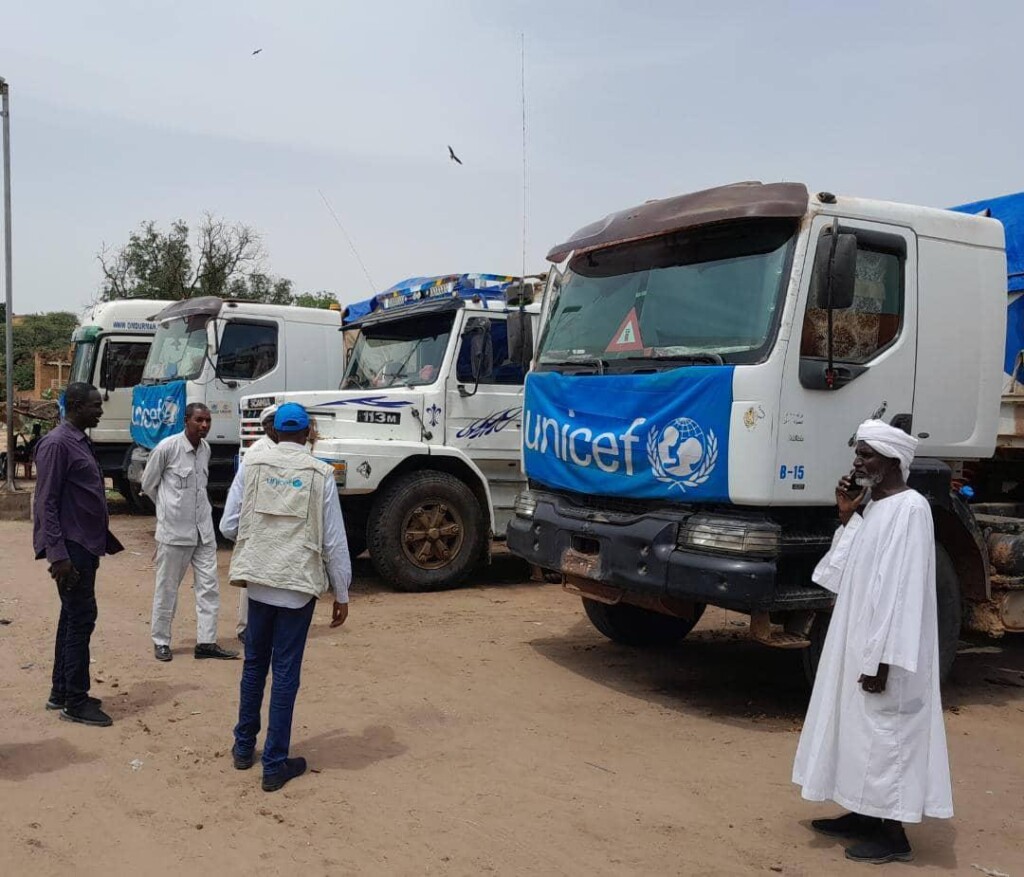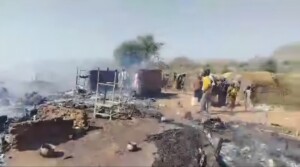Aid withheld in Sudan while 37% of the population face severe hunger

Trucks with aid from UNICEF to be dispatched to El Fasher earlier in March (Photo: SUNA)
The Integrated Food Security Phase Classification (IPC) alerted that the food security situation in Sudan has deteriorated significantly since December. The US representative to the UN accused both the Rapid Support Forces (RSF) and the Sudanese Armed Forces (SAF) of undermining the delivery of aid. The RSF allegedly seized trucks carrying relief items on their way to North Darfur, while authorities in El Fasher withheld the transport of aid to people in the region.
The IPC Food security, an international multi-stakeholder initiative based in Rome, said in a new alert on Sudan on Friday, that the security threats, roadblocks, and protection concerns limit both humanitarian response and assessments.
The alert reported that between October 2023 and February 2024, 17.7 million people in Sudan (37 per cent of the population) faced high levels of acute food insecurity, of which 4.9 million (10 per cent) emergency levels.
Ambassador Linda Thomas-Greenfield, the US representative to the United Nations, reminded the world that “18 million Sudanese today face acute food insecurity,” in a press conference at the premises of the UN in New York on Thursday.
“Only five percent of the UN’s humanitarian appeal for Sudan has been met so far, and the World Food Programme has been forced to cut aid to more than seven million people in Chad and South Sudan, including 1.2 million refugees” from Sudan,” she said.
“But humanitarian workers not only need funding, but they are also simply unable to deliver aid to those in need. We have seen them in the field since the outbreak of the conflict, often risking their lives to save people in Sudan, but their work is undermined by fighters on both sides every time. My words also apply to the Sudanese Armed Forces, which obstructed the passage of major humanitarian aid from Chad into Darfur.
“It is a matter of life and death in every sense of the word. A child dies every two hours in Zamzam camp in North Darfur, and experts warn that an additional 200,000 children could starve to death in the coming weeks and months. We therefore reiterate our call on the Sudanese Armed Forces to fully and immediately reopen all its border crossings with Chad for humanitarian purposes, including the Adré border crossing. Failing that, the Security Council must take swift action to ensure the delivery and distribution of life-saving aid, including through a cross-border mechanism if necessary.”
The Sudanese Humanitarian Aid Commission announced in mid-March that 60 lorries carrying humanitarian aid crossed the border from Adré in eastern Chad into West Darfur, after the de facto government in Port Sudan allowed a number of border crossings to be used as corridors for humanitarian aid. The borders were previously closed, the SAF citing concerns they would be used as conduits to supply the RSF.
‘Seized’
Sudan’s acting Ministry of Foreign Affairs on Friday accused the RSF of confiscating a number of humanitarian aid trucks belonging to the United Nations Children’s Fund (UNICEF) that were on their way to El Fasher, capital of North Darfur.
The FA Ministry said in a press statement that the RSF “began implementing their declared threats to prevent the arrival of humanitarian aid convoys [from Port Sudan] via the El Debba-Mellit-El Fasher route, as they mobilised large numbers of their forces near Mellit to seize that aid. [..]
“The shortest way to put an end to the suffering of the Sudanese people, end the humanitarian crisis, and stop the war is to oblige foreign supporters of the RSF to cease supplying them with weapons and funds,” the statement read.
Radio Dabanga could not obtain a comment from the RSF.
Not distributed
According to Radio Dabanga’s monitoring, El Fasher, capital of North Darfur, received 200,000 25kg bags of flour donated by the Saudi King Salman Relief Centre to be distributed to the five states of Darfur, at the rate of 40,000 bags for each state. The flour, however, has not reached the rest of the states until now.
In November, members of the Darfur Joint Force, made up of combatants of the rebel movements that signed the Juba Peace Agreement in October 2020 to protect the people in the region, seized more than 1,000 bags of flour found in warehouses in El Fasher.
The advisor to the joint force command, Gen Tijani El Deheib, told Radio Dabanga at the time that a merchant had admitted that he had bought the flour from government officials. El Deheib said that the force detained several suspects and was pursuing others.
Asked by Radio Dabanga whether the aid reached the destinations, the Humanitarian Aid Commissioner in Nyala, capital of South Darfur, Saleh Abdelrahman, denied that they received their part.
“After the state authorities sent reports on the numbers of people in need, the Federal Aid Commission allocated 136,000 sacks of flour to South Darfur,” he said. “A first batch of 40,000 sacks was shipped and reached El Fasher, where a committee had been formed by the Darfur regional government to receive and distribute the relief items.
“Unfortunately, there was no way to transport the aid to Nyala due to the insecurity and the fighting in the city, in addition to the government’s inability to provide the costs of transport to Nyala and the other three state capitals of Zalingei, El Geneina, and Ed Daein, so the shares of all states were stored in El Fasher.”
The governor of West Darfur, El Tijani Karshoum and the humanitarian aid commissioners of Central and East Darfur also denied having received their part of the flour.
Karshoum told Radio Dabanga that “we wonder why the Darfur regional government did not deliver the aid to those affected in West Darfur?”
East Darfur Humanitarian Aid Commissioner (HAC) Mohamed Ishag explained that “after waiting for some time, we sent a HAC representative to El Fasher. When he failed, we sent a delegation of community leaders. They were told by the authorities there that the flour was about to expire and had been distributed in El Fasher”.
Juma Haraz, director of El Firdous locality in East Darfur, said that SAF officers in El Fasher prevented the transfer of the relief materials to Ed Daein, capital of East Darfur, on January 15. “The East Darfur authorities began transferring 40,000 sacks of flour and rice from El Fasher to El Firdous but the loading was stopped by military intelligence officers of the Sixth Division without giving any reason”.











 and then
and then